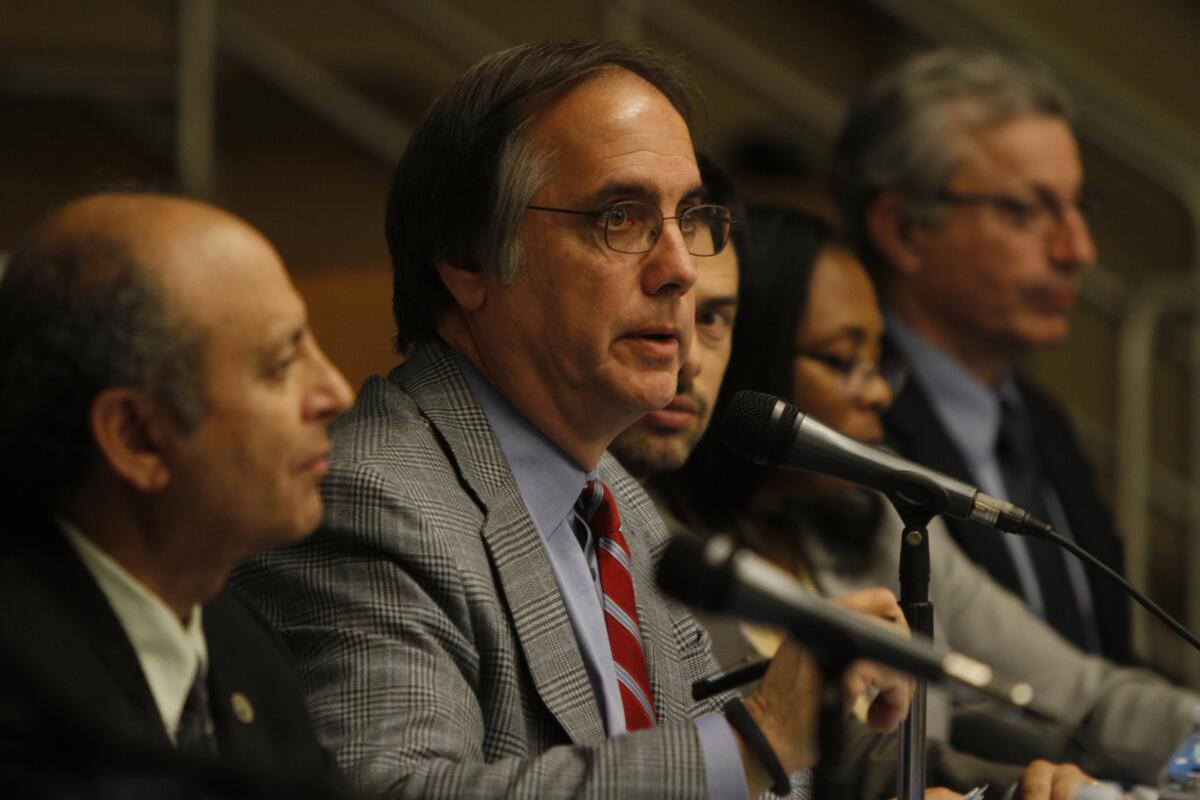Southern California air board moves to weaken pollution regulation

Southern California’s air quality board’s top executive, Barry R. Wallerstein, who is shown at a town hall meeting in Los Angeles in 2013.
- Share via
Southern California’s air quality board moved forcefully to weaken pollution regulation Friday, firing the agency’s longtime leader and reaffirming new smog rules backed by oil refineries and other major polluters.
The South Coast Air Quality Management District board dismissed Barry Wallerstein in a 7-6 vote during a closed-door session, a month after Republicans took control of the panel vowing a friendlier approach to industry.
Wallerstein, 62, was appointed executive officer in 1997 and presided over the agency charged with protecting the health of 17 million people in the nation’s smoggiest region. During his tenure, pollution diminished sharply across the region, but remains far from meeting federal health standards.
The board’s actions are expected to delay Southern California’s progress toward achieving those standards by allowing industry to avoid costly air quality improvements.
Dwight Robinson and other new board members have been outspoken about the need to shift the balance between air quality regulation and economic impacts on businesses.
“With every rule-making and regulation we need to be looking at the economic impact as well as the environmental impacts,” Robinson said in an interview this week. The board’s seven Republicans voted to fire Wallerstein. Its five Democrats and one independent opposed the dismissal.
The firing came just three days after board members posted an agenda item to evaluate Wallerstein’s performance. The board named Michael B. O’Kelly, the air district’s chief financial officer, as acting executive officer.
The ouster followed an emotional public hearing with dozens of speakers opposing Wallerstein’s removal. They said he was an effective, fair-minded regulator and urged the agency not to veer further from its mandate to protect their health.
Board members heard testimony from residents of smoggy communities of the Inland Empire and near South Bay oil refineries and from people who struggle with asthma and other pollution-triggered health problems. No one spoke in favor of Wallerstein’s firing.
“Your names will be etched on the lungs of our community members,” Sylvia Betancourt of the Long Beach Alliance for Children with Asthma told the panel before the vote.
Board members did not speak publicly about Wallerstein before their closed-door vote. No allegations of wrongdoing or mismanagement were made in the public hearing.
Wallerstein declined to comment after his dismissal.
In an email to employees, Wallerstein thanked his staff and urged them to continue working to “keep the region moving toward truly clean air.”
Republicans gained a seven-member majority on the board in February after elected officials from Orange County cities voted in Robinson, a Republican councilman from Lake Forest, to replace Santa Ana Mayor Miguel Pulido, a Democrat.
Environmentalists said Friday that Southern California’s progress in cleaning its once-notorious smog shows clean air and economic growth are not mutually exclusive.
Former AQMD Chairman Henry W. Wedaa, a former Yorba Linda councilman who served on the board from 1987 to 1994, wrote to members before the vote expressing “grave concerns” over the sudden move to oust Wallerstein.
“Such an action has the potential of leaving a sour taste in the mouths of the public we serve, and potentially undermines public confidence in the agency’s ability to carry out its mission,” Wedaa wrote.
Lizette Hernandez, a Sierra Club member from South Los Angeles, noted that recent appointments left the board with no Latinos and few women.
“Our issues are not being represented,” she said.
Also Friday, the board voted 8 to 5 not to reconsider its controversial December vote to adopt an industry-backed plan to reduce smog-forming emissions. The regulations apply to refineries, power plants and other major facilities whose nitrogen oxide emissions have leveled off in recent years rather than continue to improve.
California legislators, state air quality officials and environmentalists criticize that vote as a violation of state law and harmful to public health.
The new plan, weaker than a version Wallerstein and his staff proposed, will delay the installation of costly pollution controls at the region’s six major oil refineries and set back progress toward clean air.
During his tenure, Wallerstein faced criticism from both sides, including businesses opposed to costly pollution regulations and environmentalists who have faulted him and his staff for not moving aggressively enough to clean the air and reduce health risks from emissions.
The air quality executive serves at will and can be terminated without cause.
State Senate President Pro Tem Kevin de León (D-Los Angeles) vowed legislative action in response to the board’s move, calling it “only the latest in a disturbing trend of dirty energy interests dismantling clean air rules that the public overwhelmingly supports.”
“We need strong leadership to address some of the worst air quality in the nation, not a rubber stamp committee for the oil industry agenda,” De León said.
The Los Angeles County Business Federation called for the agency’s new leadership to act with sensitivity to the effects of its actions on industry and “with the active partnership of the business community.”
“Children deserve to breathe clean air and they deserve the healthy homes that result when a parent has a good-paying job,” said David Englin, the group’s executive vice president.
The agency has been in the spotlight in recent years over its handling of years of dangerous lead and arsenic emissions from the now-closed Exide battery plant into communities of southeast L.A. County, its response to a massive gas leak near Porter Ranch and restrictions targeting smoke from beach bonfire pits in Orange County.
Business interests, however, have complained of the costs of complying with increasingly strict regulations. Regulated industries mounted a vigorous campaign to weaken the smog rules proposed by staff in December, arguing that they would force refineries and other facilities to spend billions upgrading pollution controls.
The plan that the board approved in December and affirmed Friday is backed by the Western States Petroleum Assn. and other industry groups.
ALSO
Babysitter in nanny cam abuse case pleads not guilty
Bell Gardens man is convicted of lewd acts on teenage girl he later married
Man fatally stabbed in mosh pit at punk rock show in Santa Ana, police say
More to Read
Sign up for Essential California
The most important California stories and recommendations in your inbox every morning.
You may occasionally receive promotional content from the Los Angeles Times.










